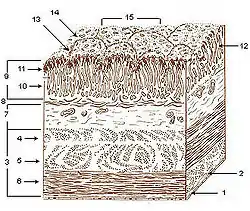| Gastric pits | |
|---|---|
 Layers of Stomach Wall:
| |
| Details | |
| Identifiers | |
| Latin | foveolae gastricae |
| TA98 | A05.5.01.032 |
| TA2 | 2918 |
| FMA | 76583 |
| Anatomical terminology | |
Gastric pits are indentations in the stomach which denote entrances to 3-5[1][2] tubular shaped gastric glands. They are deeper in the pylorus than they are in the other parts of the stomach. The human stomach has several million of these pits which dot the surface of the lining epithelium. Surface mucous cells line the pits themselves but give way to a series of other types of cells which then line the glands themselves.
Gastric acid
Gastric acid, also known as gastric juice, is secreted from gastric glands, which are located in gastric pits. Gastric juice contains hydrochloric acid, pepsinogen and mucus in a healthy adult. Hydrochloric acid is secreted by parietal cells, pepsinogen is secreted by gastric chief cells and mucus is secreted by mucus neck cells.[3]
References
![]() This article incorporates text in the public domain from the 20th edition of Gray's Anatomy (1918)
This article incorporates text in the public domain from the 20th edition of Gray's Anatomy (1918)
- ↑ "gastric pits, that each open into four or five gastric glands", Quantitative Human Physiology 2E, 2017, Joseph Feher
- ↑ "Secretions from several gastric glands flow into each gastric pit" Principals of Anatomy & Physiology 15th Ed 2017, Gerard Tortora & Bryan Derrickson
- ↑ "Britannica Online Encyclopedia - Gastric Pits". Retrieved 2009-04-13.
External links
- Histology image: 11103loa – Histology Learning System at Boston University - "Digestive System: Alimentary Canal: esophageal/stomach junction"
- Slideshow at trinity.edu
- Slide at pathology.iupui.edu
- Slide at ucsd.edu
- Slide at nhmccd.edu